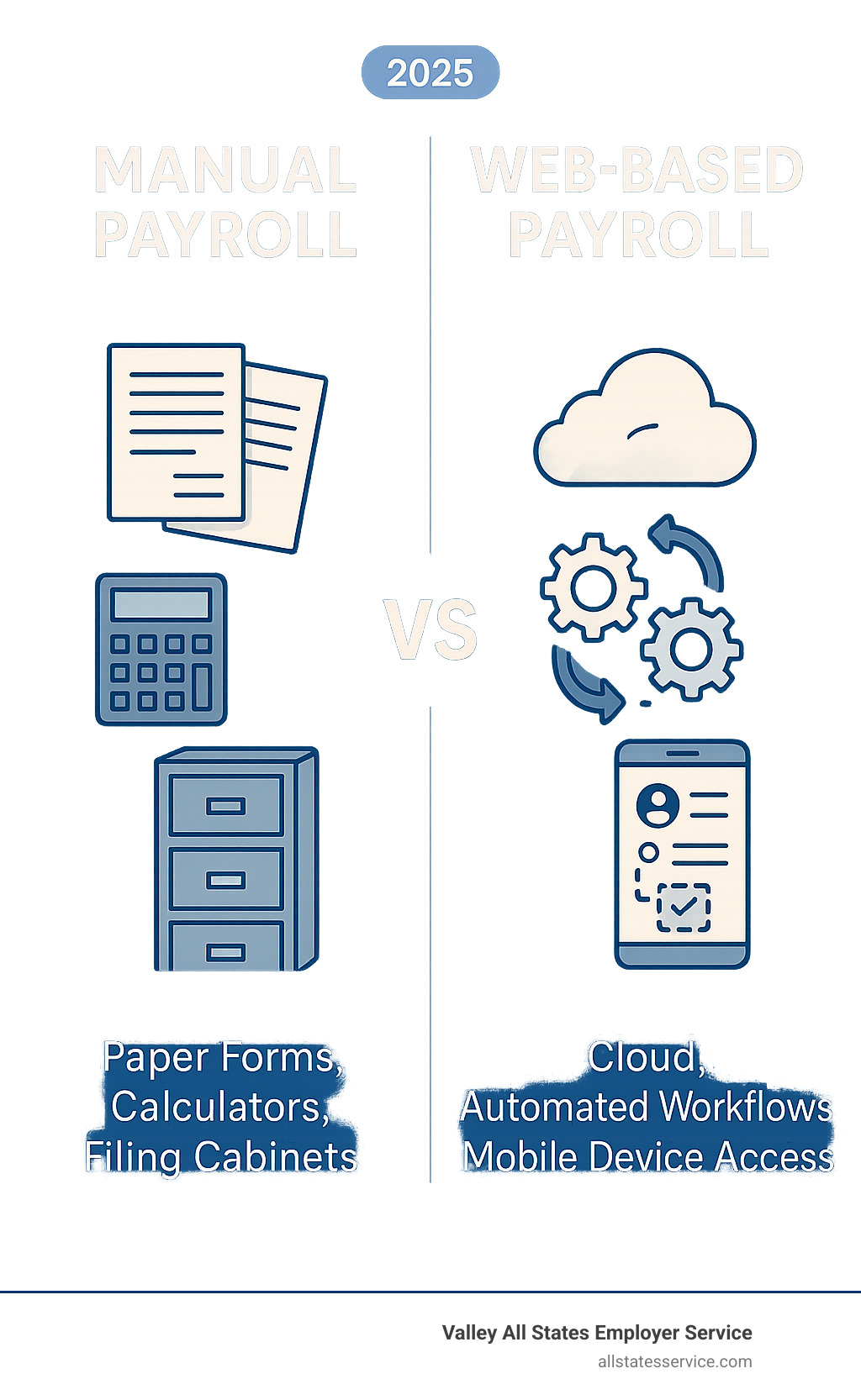Moving Beyond Manual Payroll
A web based payroll service is a cloud-hosted software solution that automates payroll processing, tax calculations, and compliance tasks through any internet browser. This eliminates the need for manual calculations and desktop software installations.
Key Components of Web-Based Payroll Services:
- Automated Processing: Calculate wages, taxes, and deductions automatically
- Tax Compliance: Handle federal, state, and local tax filings and payments
- Employee Access: Self-service portals for pay stubs and tax documents
- Integration: Connect with accounting software and time tracking systems
- Security: Bank-level encryption and data protection
- Scalability: Grow with your business from 1 to 1,000+ employees
Running payroll manually is a high-stakes balancing act where one small mistake can cause significant problems. The numbers tell the story: QuickBooks Payroll customers report saving over 80 hours a year by switching from manual processes. Spreadsheets and paper timesheets lead to wasted hours on data entry, corrections, and compliance headaches.
Manual payroll is a recipe for trouble, from tax penalties and late fees to employee complaints over incorrect paychecks. This administrative burden only grows with your team.
Web-based payroll services solve these pain points by moving everything to the cloud. No more installing software updates or worrying about computer crashes. You can access your payroll from anywhere with an internet connection and let automation handle the heavy lifting while you focus on your business.
The change is remarkable. What once took a full day can now be done in minutes. As one business owner using Square Payroll noted: “Payroll is done every other Sunday evening and takes no longer than five minutes.”

What is a Web-Based Payroll Service and How Does It Work?
A web based payroll service works like your online banking app. There’s no software to install or update, as everything happens in the cloud through your web browser.
This is a Software-as-a-Service (SaaS) model. The payroll company hosts the software, and you log in from anywhere with an internet connection. Whether at the office, home, or traveling, your payroll is always accessible.
This setup is a clear improvement over traditional methods. Desktop software ties you to one computer and needs constant updates, while spreadsheets, though seemingly cheap, often lead to expensive problems.
Spreadsheets are payroll disasters waiting to happen. A wrong formula can disrupt everyone’s paychecks. They don’t account for tax law changes or catch compliance mistakes, and they offer zero security for sensitive employee data.
The Core Features You Can Expect
Modern web based payroll services pack serious power into user-friendly packages. Here’s what you get when you make the switch.
Automated calculations handle wages, deductions, benefits, and overtime pay, calculating everything perfectly every time. No more double-checking your work.
Tax withholding becomes hands-off. The system knows current federal, state, and local tax rates and applies them correctly. Your payroll service stays updated automatically as tax laws change.
Direct deposit gets your people paid fast and securely. Most services offer next-day deposits, with some providing same-day options.
Self-service portals are a favorite feature for employees. They can access pay stubs, tax forms, and employment documents anytime, saving your HR team hours of administrative work.
Detailed reporting gives you valuable insights. Track payroll costs, analyze overtime trends, and generate compliance reports with a few clicks to make smarter business decisions.
How a typical web based payroll service operates
Running payroll becomes surprisingly simple. You start by entering basic information like employee hours, salary changes, or bonuses.
The system then takes over and processes everything automatically. It calculates gross pay, figures out tax withholdings, and accounts for benefits or garnishments.
The service handles tax remittance directly with government agencies, so you don’t have to worry about writing checks to the IRS or missing deadlines. Many providers even offer guarantees against tax filing penalties.
Secure pay distribution happens next, usually through direct deposit, ensuring your employees get paid on time. Some services also provide backup check printing options.
Year-end reporting becomes effortless. The system automatically generates W-2s, 1099s, and other required tax documents, keeping everything organized in a secure online portal for you and your employees.
The Transformative Benefits for Modern Businesses
Switching to a web based payroll service is about reclaiming your time, reducing stress, and giving your business room to grow.

The most obvious change is the dramatic time savings. Think of the hours spent on spreadsheets and double-checking calculations. Wagepoint customers report cutting their payroll processing time in half, while QuickBooks Payroll and Gusto users save over 80 hours annually. That’s two full work weeks you get back.
This efficiency translates directly into cost savings. By eliminating manual errors, you avoid costly penalties from incorrect tax filings. SurePayroll backs this up with their “No Penalty Tax Filing Guarantee,” showing how confident providers are in their accuracy.
Error reduction is almost magical with automation. The system handles complex calculations flawlessly, ensuring your employees get accurate paychecks.
Data security gets a major upgrade. Instead of files on a laptop, your sensitive information is protected behind bank-level encryption. Providers like Paychex use multiple layers of safeguards to protect your data.
Growing businesses love the scalability factor. The system adapts seamlessly as you hire more employees, with no new software or hardware required.
For today’s distributed workforce, remote accessibility is a game-changer. Process payroll from anywhere, check reports, or approve timesheets on the go. ADP serves over 1,000,000 global clients, and Gusto helps businesses register for payroll taxes in all 50 states, making remote team management effortless.
Why Small Businesses Gain the Most
Small business owners wear many hats, and payroll is often the most dreaded. A web based payroll service provides enterprise-level tools at an affordable price.
Affordable pricing models make these systems accessible. Square Payroll charges just $35 per month plus $6 per person. MyPayroll starts at $19.99 per month plus a per-employee fee. The value is clear when you compare this to the cost of mistakes or your own time.
These services level the playing field, offering small businesses the same sophisticated automation and compliance features as large corporations. You get automatic tax calculations and electronic filing without needing a full-time payroll specialist.
Compliance support is your safety net. These services automatically update for new regulations and handle complex filing requirements. For comprehensive support beyond payroll, our team at Valley All States Employer Service offers HR Compliance for Small Business solutions.
Potential Challenges to Consider
Every solution has its considerations. Being aware of these challenges helps you make an informed decision.
Internet dependency is a key consideration. A connection outage means temporary loss of access, though most providers have excellent uptime (like Wagepoint’s 99.9%), and payroll emergencies are rare.
There’s an initial learning curve with any new system. Budget some time to get comfortable, and take advantage of the training and support most providers offer.
Data migration can feel daunting, but many providers offer expert setup assistance and can pull data directly from your previous system to simplify the process.
Choosing the wrong provider can create new problems. Evaluate services based on your business size, industry, and feature needs.
Finally, watch out for hidden fees. While many providers like QuickBooks Payroll and Wagepoint have transparent pricing, always read the fine print to understand what’s included and what costs extra.
A Comparative Guide to Key Payroll Features
Shopping for a web based payroll service is like buying a new smartphone. They all perform the basic function, but the features that matter most depend on your specific needs. Some businesses need basic processing, while others require a full HR suite.

The smart approach is to understand which features matter for your business. Tax management is the foundation, but software integration determines how well payroll works with your other tools. Payment options need to match your workforce, while HR and time tracking tools can transform team management.
Modern platforms offer reporting and analytics that provide real insights into labor costs and compliance. The key is finding the right balance of functionality and simplicity.
Automated Tax Calculations and Filing
A quality web based payroll service can turn tax season from a nightmare into a non-event by handling the heavy lifting automatically.
These systems calculate federal tax compliance with precision, factoring in current tax tables and employee withholding preferences. For more details on employer responsibilities, the IRS provides a comprehensive guide. State and local tax handling becomes seamless, even with employees in multiple jurisdictions. Square Payroll, for example, handles multistate payroll taxes, while Wagepoint manages Canadian federal and provincial taxes.
The real magic happens at year-end. Automated year-end forms like T4s, W-2s, and Records of Employment (ROEs) are generated and often filed electronically. SurePayroll backs this with their “No Penalty Tax Filing Guarantee,” showing their confidence in their accuracy.
Remittance schedules are handled automatically, ensuring taxes are paid on time. For businesses needing extra compliance support, our team at Valley All States Employer Service provides comprehensive Workplace Compliance Solutions.
Seamless Integration with Your Business Ecosystem
Your payroll system shouldn’t be an island. The best web based payroll service providers build robust integrations with your existing software stack.
Accounting software integration is crucial. QuickBooks Payroll and Square Payroll sync directly with QuickBooks Online, automatically categorizing payroll expenses. CanPay offers a single-click journal entry export that works with various accounting platforms. This eliminates double data entry and reduces errors.
HR platforms and time tracking applications integration streamlines workforce management. QuickBooks Payroll and Gusto automatically sync tracked hours, PTO, and holidays into payroll calculations. Hours flow from timesheets to paychecks without manual intervention.
For larger organizations, ERP systems integration provides a complete view of business operations. These connections create single-click journal entry exports that keep financial records accurate and up-to-date, saving time and reducing costly mistakes.
Flexible Payment and HR Management
Modern payroll services have become comprehensive workforce management platforms, handling everything from direct deposit for employees to benefits administration.
Direct deposit is the standard, with providers like QuickBooks Payroll and Square Payroll offering speeds from two-day to next-day. For freelancers, separate contractor payment processing handles 1099 workers with automated tax form generation.
Multiple pay schedules accommodate different employee types (weekly, bi-weekly, etc.). PTO and sick leave tracking automates accruals, while benefits administration centralizes health insurance and retirement plans. Gusto even administers health insurance at no extra cost when used as a broker.
These integrated HR features create a complete employee management hub. For specialized benefits support, our team can connect you with trusted Employee Benefits Outsourcing Companies.
Choosing the Right Web-Based Payroll Service Provider
Finding the perfect web based payroll service requires matching the provider’s offerings to your business needs to avoid surprises later.

Your business size and complexity should guide your search. A five-person startup has different needs than a 500-employee company. Providers like ADP and Paychex tailor solutions for different business sizes.
Industry-specific needs matter. Construction companies need certified payroll, while restaurants require tip management. Ensure your chosen provider understands your industry’s quirks.
Transparent pricing models separate good providers from those that cause headaches. You want clear fee structures without sneaky add-ons. Providers like QuickBooks Payroll and Wagepoint advertise “no hidden fees” because transparency builds trust.
Quality customer support is your lifeline. Find out if you get a dedicated representative or a call center. Payworks emphasizes dedicated contacts, while Corporate Payroll Services boasts high customer satisfaction scores.
User reviews and ratings offer real-world insights. Wavepoint’s 4.6 Capterra rating and Gusto’s 4.8 average rating indicate strong user satisfaction. Pay attention to what customers say about reliability and ease of use.
Before signing up, ask any potential provider: What’s your client retention rate? How reliable is your system? Do you offer dedicated support? What security measures protect my data? How long does onboarding take? Can you handle multi-state payroll? Do you guarantee penalty-free tax filing? Are there hidden costs? What support channels are available?
Understanding Common Pricing Models
Most web based payroll service providers use similar pricing models. Understanding them helps you compare options fairly and avoid sticker shock.
The standard approach is a base monthly fee plus per-employee charges. Square Payroll charges $35 monthly plus $6 per person. MyPayroll starts at $19.99 per month plus individual fees. This keeps costs predictable.
Tiered pricing plans offer different feature levels at various price points. Basic plans cover core payroll, while premium tiers add HR tools or dedicated support.
Many providers include unlimited pay runs, giving you flexibility to run payroll as needed without extra charges. This is important for processing bonuses or off-cycle payments.
Always review contract terms. Some providers require annual commitments, while others are month-to-month. Paychex often provides custom quotes, which can be helpful but makes direct comparison harder. Watch for extras like year-end processing fees or setup charges.
Evaluating Security, Support, and Onboarding
Your payroll data is highly sensitive, containing Social Security numbers, bank details, and salaries. This makes security a top priority when choosing a provider.
Look for providers that use industry-standard encryption for data both in transit and at rest. Multi-factor authentication should be standard. Paychex emphasizes comprehensive security measures, including physical and procedural safeguards.
The onboarding process sets the tone. Great providers like Payworks offer streamlined implementation to minimize disruption. QuickBooks Payroll provides expert setup sessions to ensure accurate data migration.
Data migration requires precision. The best providers offer hands-on assistance, sometimes pulling data directly from your previous provider to speed things up.
Customer support quality varies dramatically. Payworks offers dedicated service representatives, while others use large call centers. Wagepoint highlights its “friendly, caring support,” recognizing that payroll questions need fast answers. Consider support accessibility, including phone, email, and chat options, and their hours of operation.
For businesses navigating complex compliance, our team at Valley All States Employer Service provides HR Compliance Assistance to complement your payroll solution.
Frequently Asked Questions about Online Payroll
Deciding to switch to a web based payroll service brings up many questions. Here are the concerns we hear most often from businesses making the transition.
How difficult is it to switch to a web-based payroll service?
Switching to a web based payroll service is easier than most business owners expect. Providers have streamlined the data migration process, knowing it’s a major hurdle for new clients.
The process usually starts with provider-assisted data migration. The provider’s team handles the heavy lifting, moving your historical payroll data, employee information, and year-to-date figures. QuickBooks Payroll promises to guide you through the process, while Paychex can pull data directly from your previous provider.
Guided onboarding and setup comes next. You’ll work with specialists or follow tutorials to configure your new system, getting you up and running smoothly.
Typical setup timeframes range from a few days to a couple of weeks, depending on your business’s complexity. Most businesses can process their first payroll within a week.
To start, you’ll need compensation and benefits details, employee information, tax records, and prior payroll history. Having this organized beforehand speeds up the process.
Can these services handle both salaried employees and hourly contractors?
Yes, and this flexibility is a key advantage of a modern web based payroll service. They are designed for today’s diverse workforce of employees, contractors, and freelancers.
Employee classification is handled automatically. The system knows the difference between W-2 employees and 1099 contractors, applying the correct tax treatments. Taxes are withheld for employees, while contractors receive their full payment.
Separate processing flows mean you can pay everyone through the same platform. Wagepoint and Square Payroll both highlight this capability, understanding that modern businesses need this flexibility.
Automated tax form generation handles the paperwork. At tax time, employees get their W-2s and contractors receive their 1099s automatically.
Flexible payment methods accommodate different preferences, such as direct deposit or checks, for both groups.
How secure is my company’s and my employees’ data?
Data security is a valid concern, as payroll information is highly sensitive. Reputable web based payroll service providers treat security with the same seriousness as a bank.
Industry-standard security protocols are the foundation. This includes bank-level data encryption for information both in transit and at rest, turning your data into an unbreakable code.
Data encryption in transit and at rest means your information is protected whether it’s moving between systems or stored on servers.
Physical and procedural safeguards go beyond digital protection. Providers like Paychex invest in secure data centers with restricted access and comprehensive employee training.
Data privacy policies clearly spell out how your information is collected, stored, and used, ensuring transparency and protection for you and your employees.
Role-based user access controls let you decide who in your organization can see what information, adding another layer of protection that fits your business structure.
Conclusion: Take Control of Your Payroll Today
Switching to a web based payroll service eliminates endless manual calculations, tax deadline stress, and frustrating errors. These cloud-based solutions deliver massive time savings, rock-solid accuracy, strong security, and the flexibility to grow with your business.
It’s about reclaiming your time to focus on what matters: building your business and serving customers. Saving over 80 hours a year, as QuickBooks Payroll users report, means more time for strategy and growth.
The peace of mind alone is worth it. With automated compliance and guarantees like SurePayroll’s “No Penalty Tax Filing,” you can be confident that your payroll is handled by experts.
Modern businesses need modern solutions. The future of payroll management is in the cloud, where accessibility meets efficiency and compliance becomes automatic. These services scale with you, handling everything from direct deposits to year-end reporting.
Ready to join the thousands of businesses saving time and reducing stress with automated payroll? The transition is easier than you think, with expert support available.
For comprehensive employment compliance beyond payroll, our team at Valley All States Employer Service brings the same commitment to accuracy and efficiency. We specialize in expert, impartial E-Verify processing that minimizes errors and administrative headaches. Explore our complete Payroll Outsourcing Solutions and find out how we can help streamline your entire HR operation today.